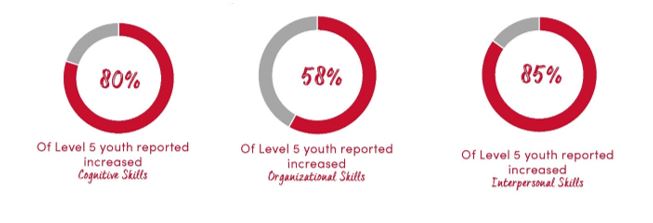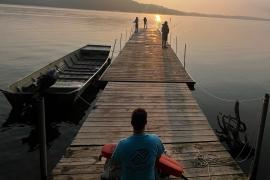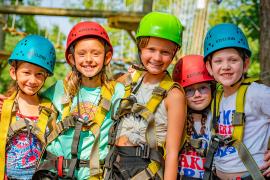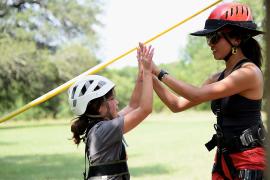Helping Kids Change Their Stories — A Taste of Camp Measurement North of the Border is a short blog series that explores Tim Hortons Foundation Camps’ summer and school programs and their approach to impact measurement and camp research. The series outlines Tim Hortons Foundation Camps’ research journey from a practitioner perspective, while highlighting challenges and early learnings in their research process. This is post 3. See posts 1 and 2.
Clearly defining our outcomes positioned us to determine how we measure progress and impact. When we began our programmatic shift in 2017, we established a measurement approach to meet both camper and operational needs to inform and continually improve. The data collected through our measurement efforts tells us what’s working and where we need to make changes to ensure we continue to provide relevant, impactful, and meaningful experiences for youth from disadvantaged circumstances — the constant variable that shows up and meets them where they are year after year.
As camp professionals, we know each camper who walks through our gates has different strengths and skills that exist within them long before they come to camp. It is our job to strengthen these existing skills, unlock hidden ones, and build on learnings year over year to help campers to thrive. To determine how well we’re doing with this and where we can improve, our campers participate in a longitudinal, mixed-method impact study that follows them over the course of their five-year summer camp experience. We leverage survey data collected in years one, three, and five of our summer program to measure and quantify impacts on program outcomes; complemented with interviews to establish narratives on the camper experience. Our campers’ responses provide a unique and honest perspective, enabling us to make program enhancements based on evidence.
What We’re Learning
While our eventual goal is to compare baseline data collected during level 1 of the program with data collected at the completion of the five-year experience, we are yet to have a full cohort of data to share. In the meantime, we’re able to explore modified, retrospective surveys to begin to find early trends and themes to inform program enhancements. From retrospective surveys collected June through August 2019, emerging themes from our level 5 campers indicate promise for both our program curriculum and measurement strategy. While our program is yielding positive results on most outcome areas, we need to take action to better support campers in making positive connections and developing organizational skills. In preparation for summer 2020, we will take the information collected from our camper surveys to further develop our programs in these targeted areas to better support our campers in building these skills.
Social & Emotional Skills
As a result of their 5-year summer camp experience, surveyed campers indicated growth in their self-confidence, self-efficacy, and empowerment. Results also suggest opportunity to better support campers in making positive connections with peers, trusted adults, and organizations.

Learning & Innovation Skills
Survey results show that level 5 campers feel equipped with the interpersonal and cognitive skills required to succeed at home, school, in the workplace, and in their communities. However, results indicate increased focus is required to help campers develop organizational skills.

What Can We Do with All This?
The results from this past summer’s retrospective surveys have influenced two key aspects of our measurement approach — how we collect and what our programmatic focus needs to be to maximize impact.
- How we collect impact data: The ins and outs of implementing a measurement strategy and data collection process across seven camp locations, resulting in a sample size of more than 2,600 has presented many challenges and opportunities for improvement. We continuously work to enhance our process to promote survey completion and youth engagement. We’ve explored different survey collection platforms and leverage our Youth Advisory Council to see how we can make our instruments more youth centered and user friendly. We’re applying learnings to change and adapt our collection process to further improve.
- What about our Program?: When looking at program design, we use survey results to refine program areas where youth need more support. Data collected over summer 2019 has emphasized a need to better support our youth in making positive connections and developing organizational skills; while presenting opportunities to explore higher scoring areas to develop best practice.
Katie Wheatley, director of program innovation with Tim Hortons Foundation Camps, specializes in data-driven curriculum design for youth who thrive in alternative learning environments. With a background in special education, Katie combines her passion for education and experience in camping to lead the innovation, measurement and development of Tim Hortons Foundation Camps programs in Canada and the US. For more information about Tim Hortons Foundation Camps, please visit timhortons.com/foundation.
Photo courtesy of MedCamps of Louisiana
Thanks to our research partner, Redwoods.
Additional thanks goes to our research supporter, Chaco.
The views and opinions expressed by contributors are their own and do not necessarily reflect the views of the American Camp Association or ACA employees.





